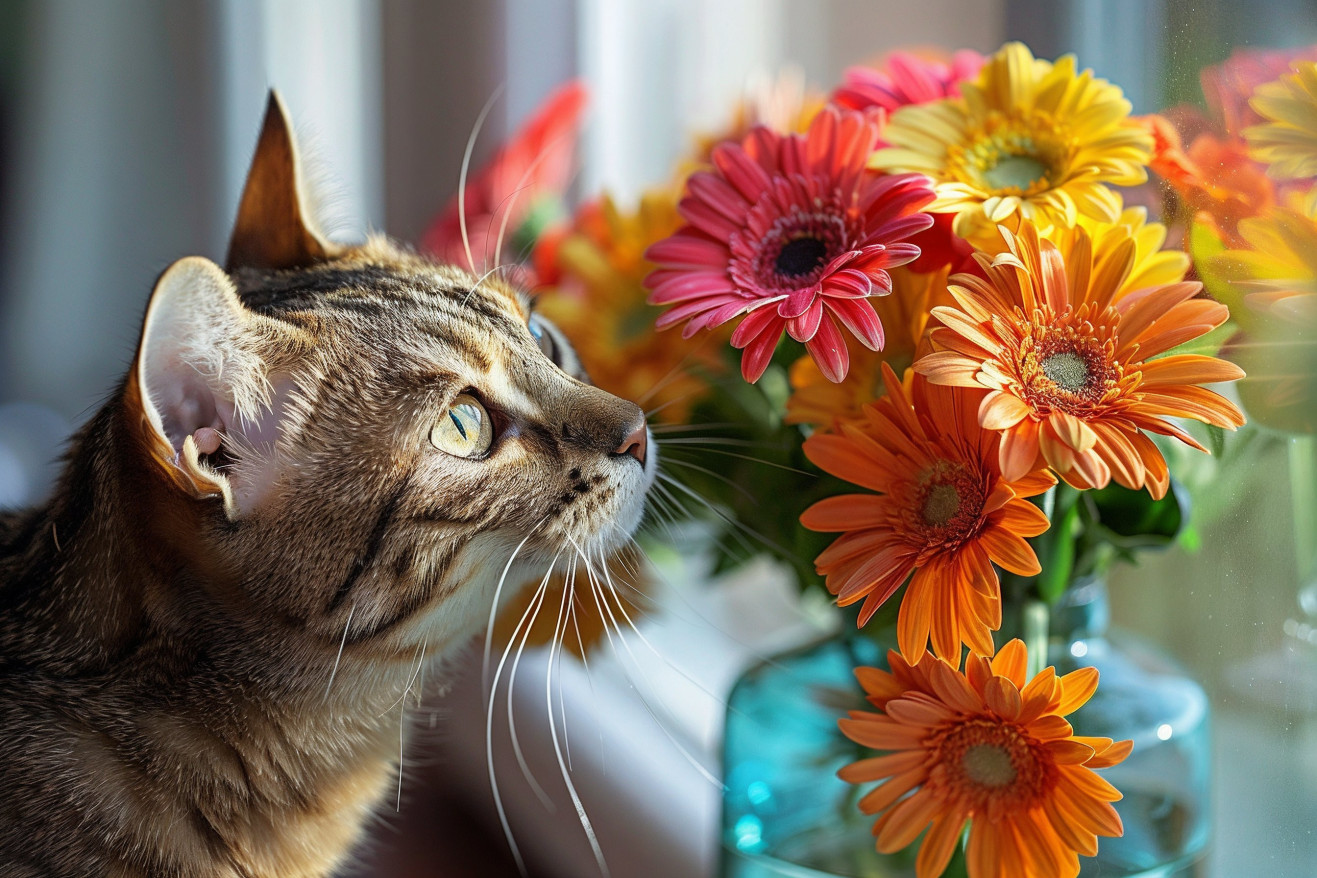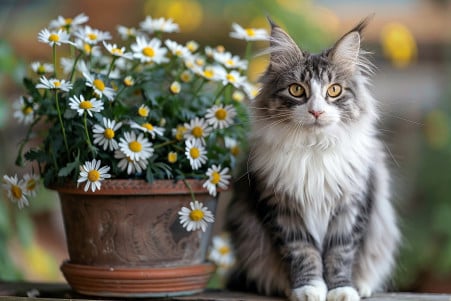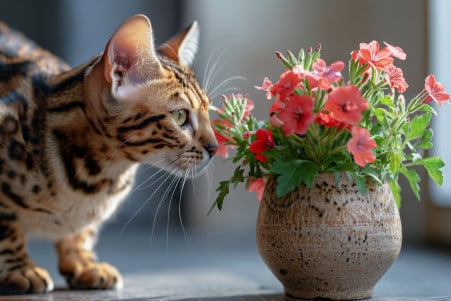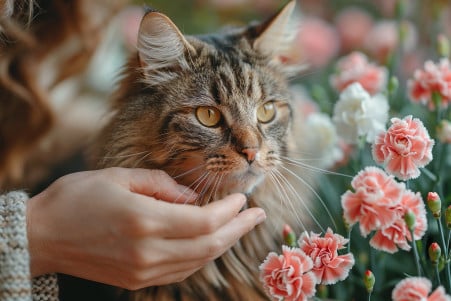Do Gerbera Daisies Hurt Cats? The Facts About Feline Safety
20 March 2024 • Updated 19 March 2024

Cat parents love their furry friends and may have questions about whether gerbera daisies are a danger to their pets. Also known as Transvaal Daisy or African Daisy, gerbera daisies are non-toxic to cats. While they can cause some minor gastrointestinal upset if eaten, gerbera daisies are not poisonous and are safe for cats.
In order to protect cats, this article will look at a variety of scientific fields, including veterinary toxicology, botany, and animal behavior research. It will also reference information from reputable sources and veterinary studies to give a complete picture of plant toxicity in cats. Through this research, readers will learn important information about the safety of gerbera daisies and best practices for making sure their homes are safe for cats.
Are gerbera daisies poisonous to cats?
How Plants Are Classified in Terms of Feline Toxicity
When it comes to classifying plants in terms of pet safety, the ASPCA and other organizations are thorough and use a set of principles to determine whether a plant is toxic or non-toxic. These principles are based on specific factors, such as the presence of naturally occurring toxins or mycotoxins in plant material.
According to the FDA, it’s important for pet parents to know how plants are classified because these classifications determine how pet poison control centers will respond to potential plant poisonings.
Gerbera daisies are classified as non-toxic because they don’t have the properties that would make them poisonous to cats. The Cornell University College of Veterinary Medicine even provides a toxicology screening protocol that stresses the importance of knowing the clinical signs of toxicity. By knowing the signs that animals are showing that could be associated with a toxic exposure, these protocols help these organizations determine their classifications.
This is why it’s important for pet parents to know how plants are classified. This knowledge can help them protect their pets from potential health problems and dispel myths about plant toxicity. This way, pet parents can feel comfortable bringing plants like gerbera daisies into their homes and creating a happy, healthy environment for everyone.
Gerbera Daisies and Other Cat Health Risks
While cats and plants can coexist peacefully, some plants can be hazardous to our feline friends. Cats Protection explains that cats often exhibit symptoms of plant poisoning, such as vomiting, diarrhea, twitching, and in more severe cases, seizures, collapse, and even coma.
While these symptoms can be scary, they can be treated if the cat is taken to the vet immediately. The organization also recommends a preventative approach to keeping pets safe from plants, which includes removing toxic plants from the home, keeping plants that could be toxic out of the cat’s reach, and providing safe alternatives like cat grass.
Gerbera daisies, however, are an exception to this rule. Known for being non-toxic, they are safe for cats, a fact that is supported by Cats Protection’s extensive lists of plants that are and are not safe for cats. However, it’s important to note that even non-toxic plants can cause mild gastrointestinal upset if they are eaten in large amounts.
Cats are known for being curious and eating plants that are in the home. A study in PMC explains that while some plants can cause acute or chronic health problems, gerbera daisies are not typically associated with these issues.
However, pet owners should be aware that any plant material, even from non-toxic plants, can cause digestive upset if it’s eaten in large amounts. This is why it’s important to keep an eye on pets and make sure that their environment is safe.
Understanding Plant Toxicity and Feline Physiology
Plants synthesize a wide range of natural metabolites to protect themselves from different kinds of threats. According to a paper in PMC, these metabolites include toxic proteins like lectins and ribosome-inactivating proteins (RIPs), which can cause everything from mild skin irritation to more serious problems like cardiac dysrhythmias.
However, the toxicity of these proteins to cats is based on a number of factors, including the plant species, the specific proteins involved, and the concentration of the proteins.
One of the reasons gerbera daisies are safe for cats is that they don’t contain the levels of toxic proteins that would cause the physiological effects that would be problematic. While the proteins may be toxic at high enough levels, the biological activities of these proteins are generally not a concern for gerbera daisies due to their non-toxic nature and low toxicity profiles.
The dose and the physiology of the cat are important factors in how a cat will react to eating a plant. The low levels of natural metabolites in non-toxic plants like gerbera daisies are typically well-tolerated by the unique physiology of cats, which may not be as sensitive to certain plant compounds as humans.
While processing methods like cooking can help reduce the toxicity of certain plants by changing or inactivating harmful proteins, this is not relevant to non-toxic plants like gerbera daisies. For these plants, the risk of toxicity is low, which means they are safe to have in a home with cats.
Feline Plant Behavior Explained: Why Cats Like to Play With Plants
Cats are known for their interest in plants and their tendency to play with them by chewing on leaves or batting at them.
Vetstreet explains that this behavior could be due to a number of reasons, including a need for fiber in their diet or an instinct to eat plants that will make them vomit and help them feel better.
Behavioral experts believe that cats eat plants as a displacement behavior when they are feeling stressed or anxious. A study in BMC Biology found that cats have a wide range of reactions to plant stimuli, and that individual cats have different behavioral responses.
While gerbera daisies are not toxic, it’s important to understand whether or not they will attract cats, which could lead to consumption. The differences in cat behavior that were found in the BMC Biology study suggest that some cats may be attracted to gerbera daisies out of curiosity, while others may not be interested at all.
While gerbera daisies are unlikely to cause the kind of strong reaction that catnip does, experts still recommend that cats be supervised to make sure they don’t overconsume and become uncomfortable.
In order to create a safe environment, pet parents should make sure that non-toxic plants like gerbera daisies are kept in the home in moderation and that interactions are supervised. By understanding cat behaviors as outlined by Vetstreet and the BMC Biology study, we can create living spaces that work for both cats and plants, ensuring that our beloved pets are safe and healthy.
Creating a Safe and Healthy Home for Your Feline Friends
To sum up, gerbera daisies are a great option for pet owners who want to add some color to their home without worrying about the safety of their cats. As shown, the ASPCA and other organizations have confirmed through their research that gerbera daisies are safe for cats, making it possible for pet owners to grow an indoor garden that is safe for their pets.
Knowing which plants are toxic to pets is important for all pet owners, as it can help them avoid potential poisoning and keep their beloved pets safe. It is also important for pet owners and the community at large to work together to make sure that people are educated and informed about which plants are safe for pets and how to recognize them.
In the end, we hope that you will work to create a home that is safe and welcoming for your cats and the plants that you choose to grow. By choosing safe plants like gerbera daisies, you can feel good about adding to your home’s decor while also knowing that you are making choices that will help keep your feline family members healthy and happy.


